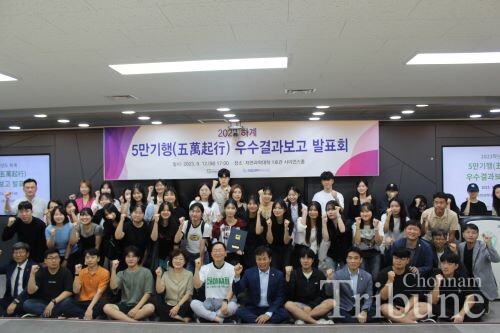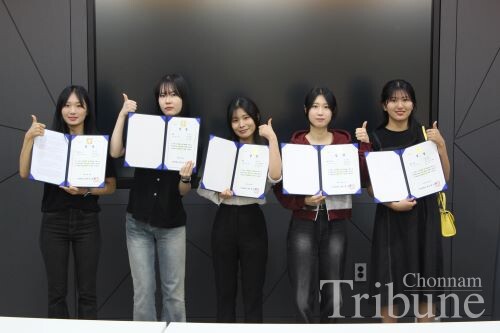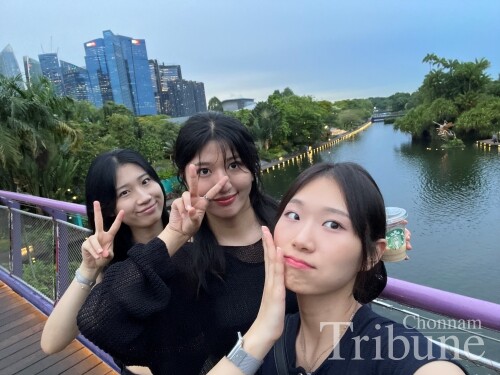
Chonnam National University (CNU) have created a new short-term outbound program called "Oman-Giaeng" this year to provide opportunities to go to Asian countries for students who have never been abroad or have not visited another country for the last 10 years. As part of the project, students chose one topic out of 17 sustainable development goals (SDGs). They planned SDG activities and performed the tasks when they arrived in the countries they chose. With the purpose of cultivating a global mindset for the university students, however, the program seemed to be a ‘half success'. As CNU wraps up its very first program, the Chonnam Tribune looked into this project designed to develop a global mindset and provide opportunities to be glocal talent.
Results of the Program
The Oman-Gihaeng Program (OGP) is a big scale outbound program in that a total of 160 students were chosen among 300 applicants. Each received 1,500,000 won as financial support per capita. “Oman” means the number 50,000 in Korean. The name refers to the fact that the only cost the participants need to consider is the fee for issuing a passport, which is 50,000 won. Except for that, the university covers other traveling expenses. Participants chose one country out of nine countries: Nepal, Taiwan, Malaysia, Vietnam, Singapore, China, Hong Kong, Thailand and Japan. The most visited country was Japan accounting for over 60 percent of the participants, according to the Office of International Affairs at the university.
After this program, an award ceremony was held on Sept. 12. Among the participants, the top three teams selected for the outstanding report won the first, second, and third prizes respectively. The first prize winner “Team Artistic Slow-Going” members said, “Our horizons expanded through this program although it was a short period journey. We performed SDGs activities to research economic growth and job vacancy problems in Japan. If we just traveled to Japan without any purpose, we would not have experienced such meaningful activities. Oman-Gihaeng was an unforgettable memory for us.”

Contradictory Standards for Selection
The theme of the program is related to SDGs, which pursue balance and harmony between current and future generations. It is considered that the subject matters are appropriate for letting students do research during their trip because the 17 goals include various phenomena taking place in the world. Also, since the students are not confined to limited subjects, SDGs could elicit multiple perspectives from them. Park Chan-mi, the program manager at the office, said that “SDGs encompass almost all content that people experience in everyday life, so it would be easier for students to set the topic than anything else.”
However, as the statistics plainly show, 101 out of 160 participants visited Japan. This goes against the intention of the project that it would give opportunities for students to understand diverse cultures through visiting diverse countries. In this respect, Yoon Hyun-shik, Dean for International Affairs said, “Above all, we wanted to ensure the autonomy in country selection. Japan would be the most efficient choice considering the time and costs for students. Nevertheless, I feel bad about the uneven selection ratio. We will think of countermeasures to solve this problem for the next project.”

Encountering Two Issues
The outcome of the program is ambivalent. The content of each individual report itself is of high quality, but on a macro level it lacks diversity. There are two things that should be pointed out. One is uniformity. Three SDGs – ‘Zero Hunger’, ‘Decent Work and Economic Growth’ and ‘Industry, Innovation and Infrastructure’ – had extra points in comparison with the rest of the 14 SDGs in the selection process, just because they are currently rising issues. In order to get higher points and to be selected, the majority of the students had to choose those three SDGs. Lee Hye-min (Sophomore, Dept. of Animal Resources) who participated in this project said, “Our team chose Singapore on the basis of the subjects that had extra points.“ In turn, this led topics becoming similar and minimized the merit of SDGs: Inclusivity. Manager Park replied to this point that “For diversity, we are thinking of assigning the same points to all topics next time.”
The other is excessive representativeness. After their trip, participants were supposed to hand in their outcome report of the project. For solo travelers, this was not a matter of concern. However, for those who traveled in groups, the one-report-per-group policy caused complications as it would be difficult for one report to accommodate every group member’s view. This submission system can prevent sharing a variety of opinions on this project because people are likely to lean on one person who writes the outcome report. In this context, having students submit individual reports respectively as their duty, in order to enable different viewpoints to be drawn could be one of the solutions.

Wishing for a Wider Perspective
The program finished as a half success and has a few drawbacks to be improved on: the autonomy of the choice of country, the benefits of particular SDGs, and finally the report submission system that allows ‘one report per group’. It would be more satisfactory if these issues were improved in the next program. Dean Yoon said, “Through this program, we wanted students to look at the world with a broader perspective. It was meaningful in that students had such a valuable experience as a step towards raising a global mindset.” The interview with ”Team Economic Innovation” that participated in this program corresponded with his expectations as well. They said, “It was a terrific experience for all of us. We learned a lot while working on the project we prepared for. We felt that the world is wide. Thank you for affording us a great chance to go abroad.
By Choi Daniel, Reporter

